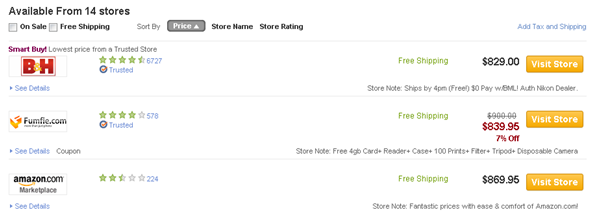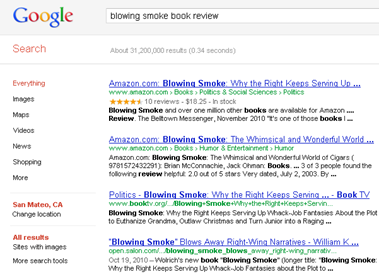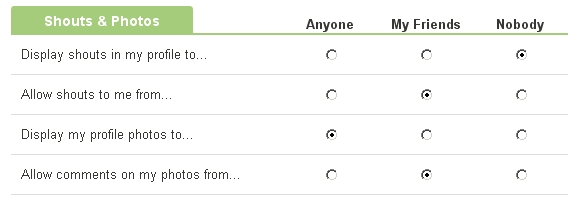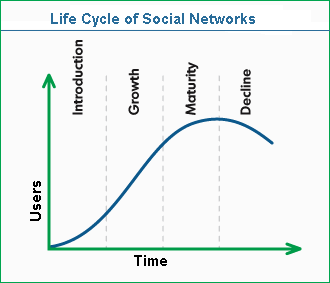This is a guest post by David Rodnitzky.
Having the best prices and largest selection of products means nothing on the Internet if you don’t back it up with incredible customer service. Treat customers badly and you will be out of business – period! Bad customer service will get you banned from major advertising networks, skewered in organic results, and ridiculed on social networks. Here are the top ways consumers can crush your business online.
Advertising Bans
If consumers complain about your business, your money won’t be green enough to buy advertising online. Both eBay and Amazon uses customer reviews as a baseline metric of eligibility to participate in their marketplace.
On eBay, too many negative customer reviews will get a seller kicked off, or in eBay terms, the seller will be declared “Not a Registered User.”

I once worked for a company that had been kicked off eBay and Amazon for bad customer service (not my fault, honest!). It took eight monthsand hundreds of pages of documentation to get us back on both sites. Had I not had personal connections at both companies, it’s unlikely I would ever have gotten the company back into the listings.Comparison shopping engines (CSEs) also use customer ratings to reward good performers and push bad performers out of the results. Most CSEs have a “trusted” or “approved” rating system that is designed to give consumers guidance on which vendor to choose, especially when price is not an issue. Shopping.com, for example, will list the vendor with the combination of the lowest price and the best customer reviews first in its results. As seen in the screenshot below, the store is called out as a “Smart Buy!” and is listed first.

Google AdWords advertisers are increasingly being held accountable for the quality of their customer service. Google has integrated star ratings from consumer review sites like Epinions or Biz Rate – but only sites with four out of five stars or greater results get an extra line in AdWords with their star ratings. If you saw five ads on AdWords and four of them had star ratings next to them, would you click on the one that didn’t?
Google is also starting to integrate “+1’s” into AdWords results, just as Facebook has integrated “likes” into Facebook ads. These social extensions are another way to give consumers an indication of whether a potential advertiser is delivering value prior to a click.
And Google reserves the right to suspend any advertiser’s AdWords account if it concludes that the advertiser is treating customers poorly. This is broadly defined to include anything from unclear landing pages, a lack of a privacy policy, misleading ads, or unclear billing practices. Suffice to say, if you are operating in a grey area of customer service, there’s a decent chance that Google will block you entirely from running AdWords ads.
Organic Search and the Voice of the Consumer
There used to be an adage that stated something like “a satisfied customer will tell three people about your business, a dissatisfied customer will tell ten.” These days, the voice of the angry customer has been dramatically amplified through review sites like Yelp and PowerReviews, as well as the built in reviews on commerce sites like Amazon.
Let’s start with Yelp. A recent Harvard Business School study found that increasing a restaurant’s Yelp rating by one star directly led to a 5 to 9% increase in annual revenue for the restaurant. That’s not surprising, considering how much Google’s organic results love Yelp. With almost 7.5 million pages indexed, there’s a high likelihood that whatever restaurant, plumber, or manicurist name you enter into Google, Yelp will be at the top of the results. And for users who have yet to decide on a specific vendor, Yelp’s listings – as with CSEs above – are sorted based on the quality and quantity of positive reviews. Bad customer service gets you pushed out of Yelp’s results.
Products are not immune to the power of customer reviews in organic search. Type in virtually any product and the odds are that you’ll find Amazon’s customer reviews prominently listed:

And even if you don’t type “review” as part of your query, Google’s Instant Search algorithm will frequently suggest a review-related query to you:

Social Media Mass Mobilization
Social media appears to have been a godsend for angry consumers. In the old days before the Internet, angry consumers had little recourse if they were mistreated by a company. These days, one bad customer experience is all it takes to destroy your company’s good reputation.
One broken guitar (and a lack of empathetic customer service) resulted in over 11 million views on YouTube of the catchy jingle United Breaks Guitars. A decision by GoDaddy to support the Stop Online Privacy Act led to an online petition on Reddit (and partially instigated by Tamar) that got thousands of domain owners to transfer their domains off GoDaddy, a revenue loss of around $370,000 a year. NetFlix’s sudden and dramatic increase in prices led to massive consumer backlash, including 67,000 negative comments on their Facebook page. Need I go on? How about Verizon’s decision (and quick retraction) to add a $2 convenience fee, or Bank of America charging $5 to consumers to use debit cards.
Social media makes it easy for like-minded consumers to band together and amplify their message, it spreads rapidly, and it always feels more genuine than the talking heads from a corporate PR team. As a result, we’re seeing large corporations closely monitoring any complaints on social media, and addressing them in hours, instead of weeks or months.
So What Does This Mean?
Let’s quickly recap: if you provide bad customer service, you could be kicked off all the major online advertising channels, the organic search results might be filled with horrendous reviews of your business, and you might be ridiculed or worse by millions on social media. To put it another way: as a business, you can no longer control the message that gets out about your products and services; provide bad service and you are almost certain to be paid back in kind with negativity online.
The solution to this ‘threat’ is really quite simple: provide great customer service! Love and listen to your customers! Read and adopt Zappos’ code of ethics. Conduct and act upon a Net Promoter Survey. If you aren’t actively working to “wow” your customers, you’re probably dying a slow, gradual death. You can hire the best agency, an awesome SEO genius, and an army of social media gurus – all of this talent cannot stop consumers from telling the world the truth about your business.
David Rodnitzky is CEO of PPC Associates, a leading SEM agency. Follow him on Twitter @rodnitzky or visit his AdWords blog.




This should be a great benefit for consumers to get the actual low down on goods and services from actual purchasing users.
I always do a search for products reviews now days, and double check where the review came from. Many sly vendors setup bogus sites and do their own reviews, but you can detect this with a little practice.
Good article and of value to all consumers.
I’ve already started heavily screening customers, to the point of turning down well-over half the opportunities which came my way in 2011. If the fit isn’t perfect, I’d prefer to take a hit on income than risk not delivering exactly what will delight customers.
I think its always good to remember how important our customers are. Without them there is no business so we do need to try and keep them as happy as possible.
Sorry, but your “solutions” suggested in your post just don’t cut it, at least with regard to Yelp. You can provide “great customer service” and “wow” your customers every day but the Yelp crowd won’t care if they don’t “like” your business for what ever reason.
Many small business, including my own, have been seriously hurt by disingenuous and poor Yelp reviews. Yelper’s are almost like a cult. They visit your business and leave a review on their smart phone while they’re walking out your door and could care less about the impact they may have on a small local business like my own. Instead of voicing their concerns directly with the owner or manager and giving them the opportunity to address their “issue” on the spot, they hide behind their Yelp accounts and never give the owner an opportunity to fix the issue!
I once made the mistake of politely responding to a Yelp review and offering to address any concerns the Yelper had and hoped that they would give us “another chance”. Wow, you would have thought that I showed up at the guys doorstep with a shotgun. The response that I got basically said “how dare you challenge or respond to my review, can’t you see that I have over a hundred reviews….”. It’s very obvious that most Yelpers have never owned a business (and probably never will).
I own a small retail store that has been business for nine years. We are very proud of our customer service, unique inventory and competitive prices. In fact, we have won numerous customer service awards and were even featured in INC Magazine in an article about how other business should follow our lead on how to treat the 21st century consumer! We have 4.5 stars on Google, incredible reviews on CityGuide and many other legitimate review portals. I have over 340 unsolicited reviews on my website from “raving fans”.
I’ve had many customers tell me that they couldn’t believe our Yelp reviews. Many were so upset that they opened a Yelp account and left their own review. But of course, these reviews were “filtered” by Yelp because my customers don’t fit the Yelp “profile”.
It’s no wonder that Yelp is involved in numerous legal battles, not only about their deceptive sale policies (sales reps claiming that they can remove poor reviews if you buy Yelp advertising) but about their review process.
The bottom line is that there’s NOTHING you can do about Yelp reviews other than just go about your daily routine of providing outstanding customer service and hope that someday one your own real customers will be “allowed” to leave their own review.
So Yelpers, I have a challenge for you. The next time you’re not happy with a business talk directly with the owner or manager first and then leave your review (I know, it’s hard because your fellow Yelpers will belittle you because you actually “talked” with the owner…some nerve you have). Tell your fellow Yelpers how the business handled your problem. After all, no business gets it right 100% of the time, but what’s really important is how the business handles the “issue”.
I’ve got to agree with Rhonda on this one. We did a project for a client, did all he asked, then he refused to pay. When we withheld the final product until we received payment (as our contract says we would), he went ballistic and basically wrote trash about us all over the internet. First negative review ever. When we responded to his Yelp review, he went even more nuts. When we asked Yelp to help, they REMOVED 8 positive, 5-star reviews and just left his. They said the 8 positive reviews looked like spam, when in fact they were real. Since 1/3 of our business comes from Google, we went from getting 8-10 leads a month to ZERO. Yelp is the biggest scam imaginable, and they really don’t care how it effects the little guy.
Sorry to hear that Helen. Sounds like Yelp has some work to do to fix their process.
I’m still surprised at how many businesses think social media is a novelty used by geeks and kids. Some think they can simply stick their heads in the sand and wish it away. Others think their customer sins won’t find them out. Thanks, David, for making the case of how even more critical good customer service is. And thanks for pointing out NetPromoter. I hadn’t seen that before.
NetPromoter is a great tool – we use it for our company and its really useful! Highly recommended!
Good article, I think not alot of businesses realize the growing use of “rating your purchase experience” methods to stick bad experiences to the businesses until they fix it. BBB (Better Business Bureau) is another type of business that reviews business customer experiences.
@ Steve: Agreed. Consumers definitely benefit from all the online tools out there that allow them to have their voice heard!
@ Dave: Great point. In the book “The Loyalty Effect” by Fred Reicheld, he talks about “good revenue” and “bad revenue.” Basically, by turning down customers who would end up complaining about your business (and not being long-term customers), you are turning down “bad revenue”, which is the right thing to do!
@ Steven P: Agreed. Its funny how so many businesses forget that their success depends on customers, not on their own innate abilities!
@ Rhonda: There are certainly mainly businesses who feel that they have been treated unfairly on Yelp, or that they have been victimized by fake reviews (either negative reviews against them, or positive reviews for competitors who are undeserving of them). I personally think Yelp is fairly accurate, especially when you start to get a large volume of reviews. There will always be unhappy customers no matter what you do, but if you try your best to provide great customer service, over time I believe this will be reflected in your Yelp ratings.
@ Andy: Good point. One thing I will say about the BBB is that their reviews are often quite flawed. For example, if a business pays the BBB for membership, many people have alleged that the business’ rating ends up being higher!
This is bad practice and worrying when this kind of behaviour is seen online. I think etiquette should be in order at all times.
Interesting read. If your consumers hate you, there is no reason why you should be there in the market.
BTW, is there a typo in this sentence: “..or in eBay terms, the buyer will be declared “Not a Registered User.” Should it be ‘seller’ in place of ‘buyer’ or I missing something.
Good catch, Gouri – I fixed it.
Check Yelp out on Google with the words “yelp protection racket”
Good stuff! I had no idea Ebay/Amazon booted companies off their networks for bad customer service. Adwords too? Very interesting.
A lot of this is new to me, and really disheartening. I read reviews on businesses and products, and have believed that people were leaving honest opinions. It seems that this may not always be the case.